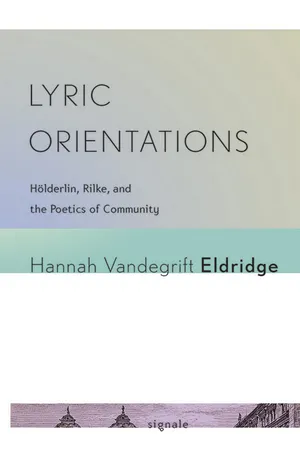
Lyric Orientations
Hölderlin, Rilke, and the Poetics of Community
- 256 pages
- English
- ePUB (mobile friendly)
- Available on iOS & Android
About this book
In Lyric Orientations, Hannah Vandegrift Eldridge explores the power of lyric poetry to stir the social and emotional lives of human beings in the face of the ineffable nature of our mortality. She focuses on two German-speaking masters of lyric prose and poetry: Friedrich Hölderlin (1770–1843) and Rainer Maria Rilke (1875–1926). While Hölderlin and Rilke are stylistically very different, each believes in the power of poetic language to orient us as social beings in contexts that otherwise can be alienating. They likewise share the conviction that such alienation cannot be overcome once and for all in any universal event. Both argue that to deny the uncertainty created by the absence of any such event (or to deny the alienation itself) is likewise to deny the particularly human condition of uncertainty and mortality.
By drawing on the work of Stanley Cavell, who explores how language in all its formal aspects actually enables us to engage meaningfully with the world, Eldridge challenges poststructuralist scholarship, which stresses the limitations—even the failure—of language in the face of reality. Eldridge provides detailed readings of Hölderlin and Rilke and positions them in a broader narrative of modernity that helps make sense of their difficult and occasionally contradictory self-characterizations. Her account of the orienting and engaging capabilities of language reconciles the extraordinarily ambitious claims that Hölderlin and Rilke make for poetry—that it can create political communities, that it can change how humans relate to death, and that it can unite the sensual and intellectual components of human subjectivity—and the often difficult, fragmented, or hermetic nature of their individual poems.
Frequently asked questions
- Essential is ideal for learners and professionals who enjoy exploring a wide range of subjects. Access the Essential Library with 800,000+ trusted titles and best-sellers across business, personal growth, and the humanities. Includes unlimited reading time and Standard Read Aloud voice.
- Complete: Perfect for advanced learners and researchers needing full, unrestricted access. Unlock 1.4M+ books across hundreds of subjects, including academic and specialized titles. The Complete Plan also includes advanced features like Premium Read Aloud and Research Assistant.
Please note we cannot support devices running on iOS 13 and Android 7 or earlier. Learn more about using the app.
Information
Table of contents
- A Note on Translations
- Acknowledgments
- Introduction: On Orientation
- 1. Skepticism and the Struggle over Finitude: Stanley Cavell
- 2. The Anxiety of Theory: Hölderlin’s Poetology as Skeptical Syndrome
- 3. Calls for Communion: Hölderlin’s Late Poetry
- 4. Malevolent Intimacies: Rilke and Skeptical Vulnerability
- 5. Figuring Finitude: Rilke’s Sonnets to Orpheus
- Epilogue: “Desperate Conversation”—Poetic Finitude in Paul Celan and After
- Selected Bibliography
- Index